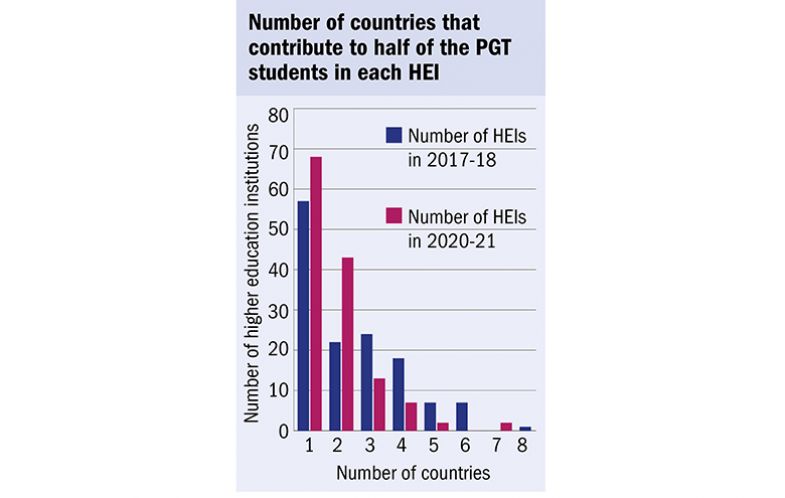More than four-fifths of UK universities rely on just one or two countries when recruiting their postgraduate taught (PGT) students, according to an analysis.
Research consultancy Education Insight linked the lack of student diversification to Brexit, with a decline in the number of European Union students leading to an over-reliance on markets such as China and India.
Using Higher Education Statistics Agency (Hesa) data, the organisation found that 50 per cent of UK higher education institutions recruited more than half of their PGT students from just one country in 2020-21 – up from 42 per cent in 2017-18.
A further 32 per cent of universities recruited the majority of their PGT students from two nations – double the proportion that did the same three years earlier.

Janet Ilieva, founder of the Bristol-based consultancy, said this leaves universities “heavily reliant” on just one or two markets.
She said Ucas data showed a “significant decline” in accepted applicants from the EU, with external pressures such as the cap on fees for domestic students forcing universities to intensify their student recruitment.
Brexit has “made diversification very difficult” because “students from 27 EU countries have lost access to student finance in the UK and need visas”, Ms Ilieva told Times Higher Education.
“Declines in EU students increase the reliance on the next big markets – and increase the exposure to China and India,” she added.
Some universities rely on one market for as much as 70 per cent of their total international intake, which puts them at “significant risk” if anything were to happen in that country, Ms Ilieva said.
She said London-based institutions appeared to be better at ensuring some geographical diversity among student intakes, while it is harder for universities and colleges in locations that are less well known internationally.
In 2017-18, China provided the most international PGT students for 55 per cent of UK institutions, but last year that figure fell to 35 per cent. At the same time, the proportion of institutions with most of their PGT students from India jumped from 15 per cent to 46 per cent.
In addition to the potential financial risk, relying too much on one country for international students could have a negative impact on the student experience, Ms Ilieva said.
“One of the key drivers for international student mobility, particularly at the postgraduate level, is the expectation of an internationalised learning experience with a classroom consisting of students from many different countries,” she said.
The data show that the proportion of universities recruiting the majority of their postgraduate-level research students from one or two countries has climbed to 67 per cent. However, Ms Ilieva noted, there was more diversity at bachelor’s level.
She warned that increased diversity was not risk-free, and that maintaining a geographically diverse recruitment portfolio comes at a cost.
Universities UK International said diversification was “becoming a critical tool in universities’ risk mitigation and academic development strategies”.
“The benefits to universities include greater financial stability and avoidance of over-reliance on a handful of courses, but also creating more stimulating and internationalised learning environments for all students rather than just those on traditionally international programmes,” a spokesperson added.
Register to continue
Why register?
- Registration is free and only takes a moment
- Once registered, you can read 3 articles a month
- Sign up for our newsletter
Subscribe
Or subscribe for unlimited access to:
- Unlimited access to news, views, insights & reviews
- Digital editions
- Digital access to THE’s university and college rankings analysis
Already registered or a current subscriber? Login








